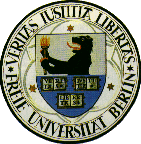
Universitätsvorlesung: Computer- und Informationstechnik im 21. Jahrhundert

FU Berlin, Fachbereich Mathematik und Informatik, Institut für Informatik

|
Universitätsvorlesung: Computer- und Informationstechnik im 21. Jahrhundert |

|
Vaggelis K. Ouzounis,GMD-Fokus, Berlin
Advanced Electronic Commerce Business Models, Platforms and Technologies
Rapid advances in communications, open networks (internet, WWW), service
provision frameworks, multimedia technologies, interoperable distributed
technologies, object-oriented and agents-based technologies have been opening
and enabling new effective ways of doing business electronically. All these
technological advancements drive the creation of new business models, and
consequently the development of new ways of work.
The business information system of tomorrow, the new trading systems,
the new working environments, and, in general, the new electronic commerce
services, applications and business models must meet several fundamental
criteria to allow an organisation to extend the critical business processes
and participate in high dynamic collaborative environments in a easy and
flexible way. New services, applications and underlying infrastructures
and facilities are needed in order to satisfy the major business drivers
and requirements. Some of the key, critical technical requirements are:
extension of business applications and data to the web and to the internet;
integration of existing legacy applications, in a easy and dynamic way;
flexible and efficient management of services and applications; high degree
of interoperability between different multi-vendor products and applications;
universal access for a wide range of client terminals; mobility support
for different devices and terminals; standard common business processes
and applications between employees, supplies, and customers; high degree
of configuration, integration, and customization facilities and services;
and „plug&play“ integration of functional components and save mechanisms
for re-use and integration of them.
Solutions to the above problems are beginning to appear that address
these needs. Most of these solutions focused on web-centered style computing
that extends and complements existing IT investments, component-based development
of services and applications based on open, interoperable underlying services
and facilities (e.g. CORBA architecture), service management frameworks
that enable consistent and secure access to services and applications,
(e.g. TINAC, NMF, etc.), „plug and play“ integration of interoperable components
in distributed systems, (e.g. CORBA, JavaBeans, and DCOM), interoperable
applications and services, (e.g. Java based solutions, CORBA, DCOM), component-based
development and integrated development tools, (e.g. UML, and commercial
integrated development tools), different terminal technologies from thin
clients until mobile devices, (e.g. Network computer) and PDAs, access
control and security services, (e.g. smartcards, SET, PKI), integration
of legacy systems frameworks and concepts, (e.g. CORBA wrappers), and trading
systems that integrate business processes with back-end business applications
and provide the ability to employees, customers and suppliers to interact
transparently, (commercial products.
However, the status of these developments is rather immature and additional
work is required in terms of Research and Development.
This presentation is actually aiming at summarising and identifying
key areas of R&D work that require further developments and research.
| [ home ] [ up ] [ search ] | sekr@inf.fu-berlin.de |